The Serum Glutamate Pyruvate Transaminase (SGPT), al...Read more
Blood
Unlock special
discount on
this package
Login to Unlock 🔓
Also Known As
Serum Glutamate Pyruvate TransaminaseNABL Accredited lab*

Booking Benefits Unlocked Worth FREE 799

Report Consultation

Diet Plan
*Available once your report is generated.
At Redcliffe Labs, we have a single goal: to give India its right to quality diagnostics.
Customers served
Tests Processed Everyday
Cities
Collection Centres
World Class In-house Labs
Home Collection Experts
1 Test Parameters
SGPT / ALT
1 PARAMETER INCLUDED
1 PARAMETER INCLUDED
- SGPT/ALT
Helps you know your test better
Who should take the SGPT Test?
- Anyone having liver disease or who is at risk for liver problems should take the SGPT Test. It helps monitor the progression of the condition while assessing your health.
Why take the SGPT Test?
- Your healthcare provider may ask you to take the SGPT Test if you have visible signs of liver problems or if you are in the high-risk factor category.
What are the benefits of the SGPT Test?
- Helps detect liver problems early.
- Enable healthcare professionals to develop appropriate treatment plans.
- Prevent further complications and allow you to take control of your health.
Top Booked Health Checkup Packages
Reports in 12 hours
|Parameters 94
Reports in 12 hours
|Parameters 89
Reports in 12 hours
|Parameters 96
Reports in 12 hours
|Parameters 96
Reports in 12 hours
|Parameters 90
Helps you know your test better
Q. How can I book my test?
Q. In how much time will I get my test report?
Q. Where can I see or get my test results?
Q. Is home sample collection available for the SGPT Test?
Verified by Medical Expert

WRITTEN BY
Sheena Mehta

MEDICALLY REVIEWED BY
Dr. Pradeep Lodha
Introduction to SGPT-ALT
The liver performs vital functions, like filtering toxins, producing enzymes, and performing other critical metabolic processes. One key indicator of liver health is the SGPT blood test, also known as the ALT (Alanine Transaminase) test.
This is a simple blood test, but it plays a key role as it measures the enzyme called serum glutamate pyruvate transaminase (SGPT) in your blood. Whenever your liver is damaged, this enzyme leaks into the bloodstream from the liver cells, so elevated levels of the enzyme in the bloodstream indicate liver damage or inflammation.
Serum Glutamate Pyruvate Transaminase, the complete form of the SGPT, is also known as the alanine transferase enzyme. It is primarily found in the liver, with slight traces also present in the kidneys, muscles, and heart. The enzyme converts protein into energy for the liver cells.
When your liver cells get damaged due to diseases (jaundice, hepatitis, NAFLD), alcohol abuse, or medication, these cells are not able to absorb the enzyme, thus they start leaking into the bloodstream and cause the elevation.
What is the SGPT/ALT Blood Test?
The SGPT (Alanine Transaminase) Test is used to detect the enzyme levels in the body, thus it helps detect:
- Liver Inflammation
- Hepatitis A, B, or C
- Liver Cirrhosis
- Alcoholic fatty liver or non-alcoholic fatty liver
- Side effects of any medication on the liver.
The SGPT blood test is also included in the liver function test (LFT), and regular monitoring of the ALT enzyme helps you regulate your liver health. This test can also help track the progress of any ongoing liver condition and assess the impact of your lifestyle changes and medication on your liver.
SGPT Test details in brief
| Also Known As | ALT, Serum Glutamic-Pyruvic Transaminase, SGPT, GPT, Alanine Transaminase, SGPT/ ALT Test |
| Purpose | Often used as a routine blood test, it monitors liver health & diagnoses liver problems. |
| Preparation | Do not take any over-the-counter medicine without confirming with your Doctor. |
| Fasting | No Fasting Required |
| Get Reports | Within 12 hours |
| SGPT Test Cost | INR ₹270 |
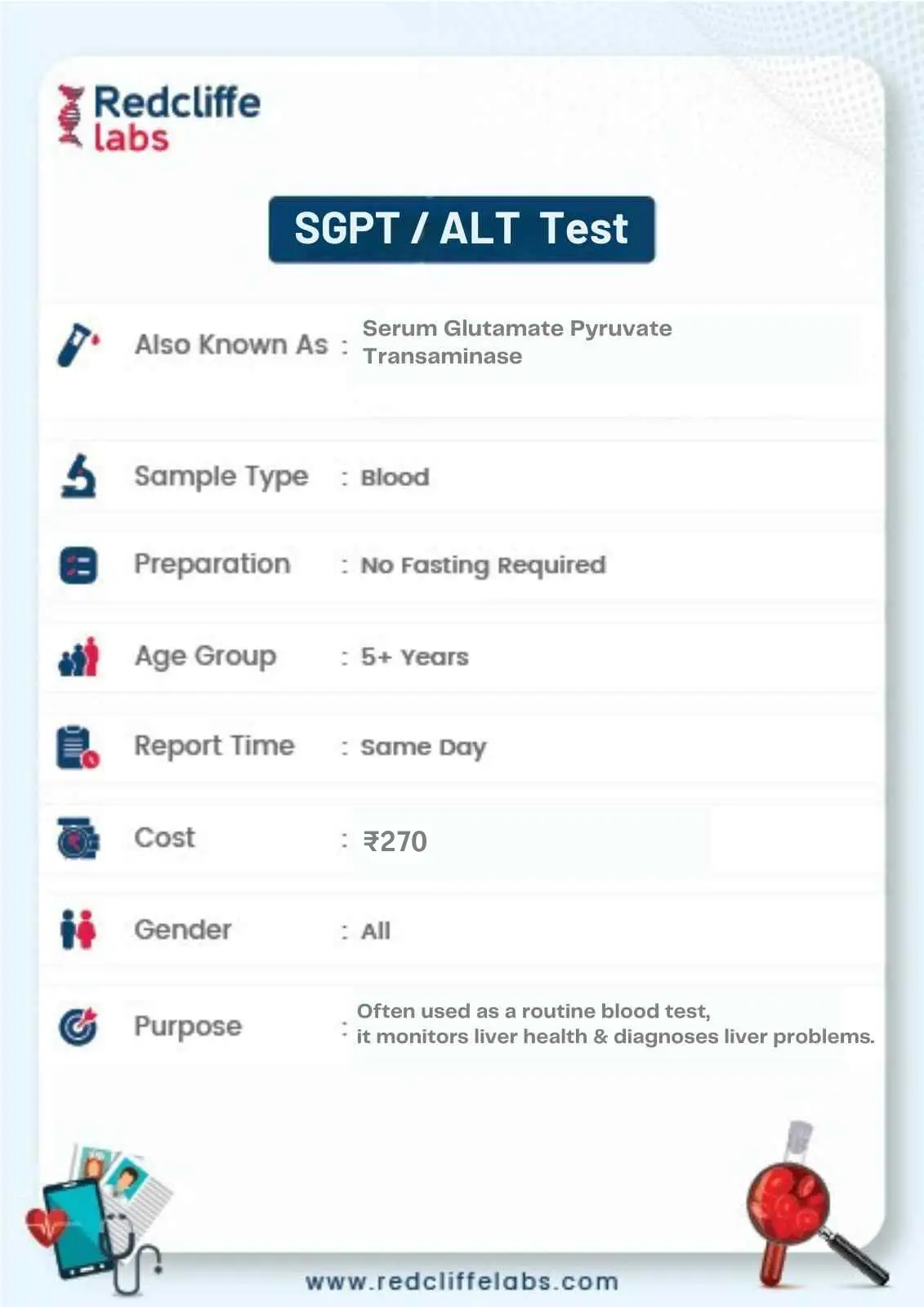
Purpose of the SGPT Test
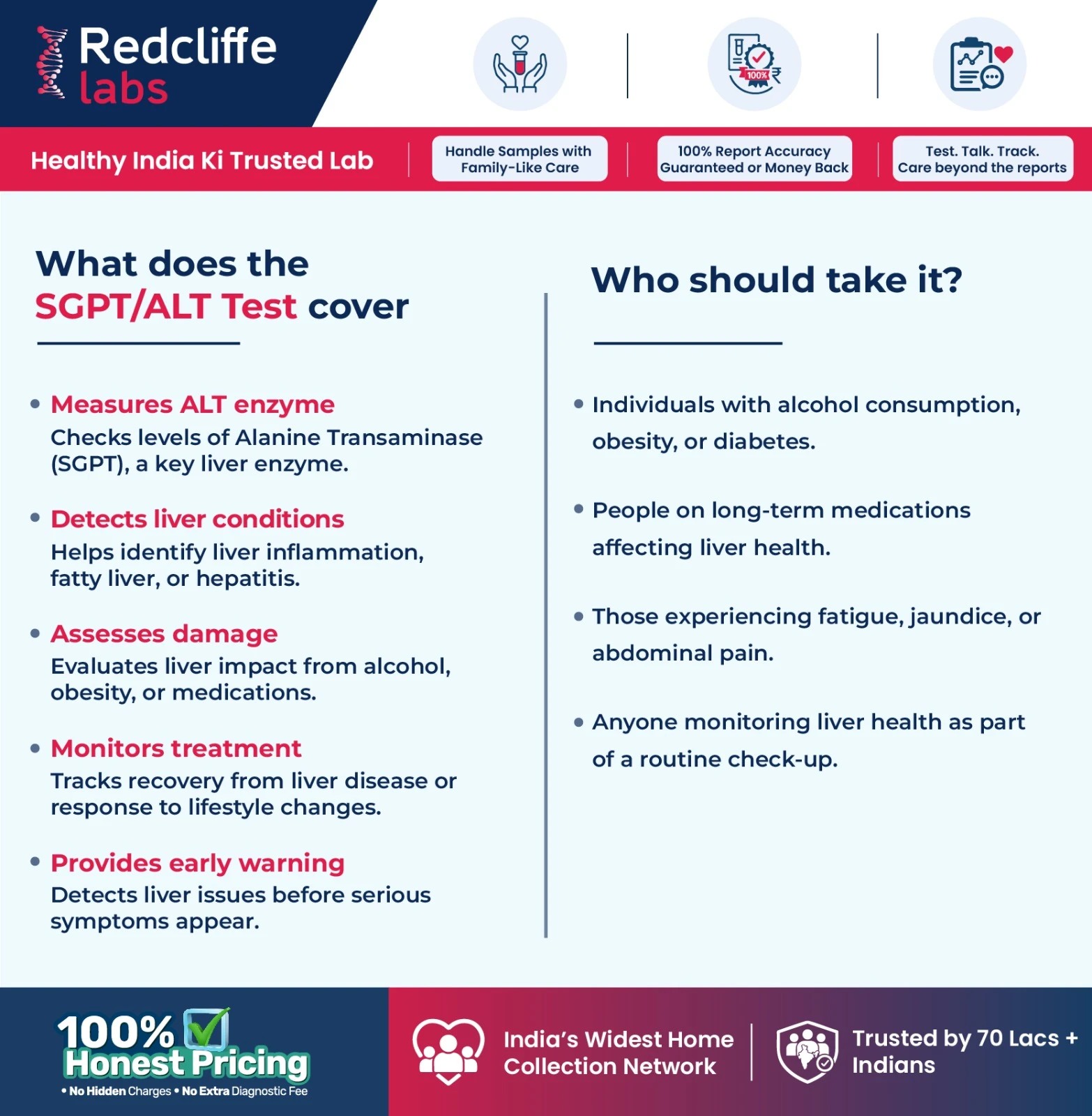
The purpose of the SGPT test is to assess the liver's health. The damaged liver can cause many health issues, but the test can help to identify potential health concerns. Here are the main purposes of the SGPT blood test-
- Detecting liver damage- A high SGPT level can indicate liver damage caused by various conditions, such as hepatitis, cirrhosis, and fatty liver disease.
- Monitor liver disease- The SGPT ALT test helps to monitor the progression of existing liver disease and assess the effectiveness of treatment.
- Screen for liver problems- The SGPT test can be recommended as a routine blood test to screen liver problems, especially in people with risk factors such as obesity, diabetes, or heavy alcohol consumption.
- Evaluate the cause of symptoms- If you notice symptoms such as fatigue, nausea, vomiting, or abdominal pain, the SGPT test can help determine the cause.
- Monitor the effects of medications- Certain medications can cause liver damage. The SGPT ALT test can monitor liver function in people taking these medications.
What does your liver do?
The liver is one of the most vital organs in the human body, playing a crucial role in digestion, metabolism, detoxification, and immune regulation.
- The liver filters toxins, drugs, and harmful substances from the blood.
- It produces bile, which helps to digest fats and absorb fat-soluble vitamins D, A, E, and K.
- It helps to break down proteins, carbohydrates, and fats into usable energy.
- Helps prevent diabetes by maintaining balanced blood sugar levels.
- Produces albumin, a protein that regulates blood volume and prevents fluid retention (edema).
- Synthesizes clotting factors that help stop bleeding when injured.
- Helps break down fats for energy production.
- Helps balance sex hormones, including estrogen and testosterone.
- Breaks down excess hormones to maintain proper function.
What are the uses of the SGPT test?
The SGPT test, also called the ALT (Alanine Transaminase) test, primarily involves blood sampling to evaluate liver health and function. The SGPT test is used to:
1. Detecting liver diseases: The SGPT test is beneficial in several ways, including detecting liver diseases. These may include hepatitis, fatty liver disease, and liver cirrhosis. Let’s explore these in detail.
- Hepatitis: The SGPT test helps identify inflammation or infection of the liver, which viruses, alcohol, or other toxins can cause.
- Fatty liver: The test helps detect fat accumulation in the liver. It can damage the liver.
- Cirrhosis: It is scarring (fibrosis) of the liver. It leads to scarring of the liver. Liver cirrhosis is a late-stage liver disease.
2. Monitor liver function: A healthcare provider may suggest an SGPT test to evaluate how well the liver is functioning. The test is crucial for people who are on prolonged medications and are thus likely to harm the liver. Additionally, the test helps assess liver function in conditions like jaundice or liver-related symptoms.
3. Track liver recovery: The test helps monitor the liver's recovery after injury, surgery, or disease and evaluates the effectiveness of treatment for liver-related illnesses.
4. Diagnose underlying health issues: In addition to all these reasons, a healthcare provider may also suggest a test to diagnose underlying health issues, such as heart disease, muscle injuries, and gallbladder disorders, in case of elevated SGPT levels.
- Screen for liver damage in high-risk individuals: The test is helpful for people with conditions such as alcoholism, obesity, and diabetes.
- Evaluate symptoms related to liver dysfunction: Nevertheless, the SGPT test helps evaluate symptoms related to liver dysfunction, such as fatigue, jaundice, abdominal pain, dark urine, or light-colored stools.
What does the SGPT Test detect?

The SGPT test, also known as the serum glutamic-pyruvic transaminase (ALT) test, is a blood test used to assess liver health. It measures the level of an enzyme called alanine aminotransferase (ALT) in the bloodstream. SGPT/ALT is the enzyme that helps the liver to function properly. ALT is found in the liver cells, and when the liver is damaged, ALT leaks into the blood. An SGPT test primarily detects liver damage. A high SGPT level can indicate damage caused by various conditions, such as:
- Hepatitis.
- Cirrhosis
- Fatty liver disease
- Drug-induced liver injury
- Autoimmune hepatitis
- Cancer of the liver
Who needs an SGPT Test?
While anyone can take the SGPT test, here are some people who should take the SGPT regularly-
- People with symptoms of liver disease:
- Yellowing of skin and eyes (jaundice)
- Dark-colored urine
- Loss of appetite
- Fatigue and weakness
- Abdominal pain or swelling
- People with risk factors for liver disease:
- Heavy alcohol consumption
- Obesity or metabolic syndrome
- History of hepatitis B or C infections
- Use of liver-toxic medications (e.g., certain antibiotics, painkillers, or cholesterol drugs)
- People with a history of liver conditions:
- Fatty liver disease (NAFLD/NASH)
- Cirrhosis
- Hepatitis (A, B, C, D, or E)
- People with diabetes and other metabolic Disorders:
- As routine health checkups
- People taking long-term medications
- People Taking Long-Term Medications
- People with abnormal symptoms
If SGPT levels are elevated, further tests, such as SGOT, bilirubin, alkaline phosphatase (ALP), and ultrasound, may be needed to diagnose the condition.
Preparation for the SGPT Test
The SGPT test requires no or minimal preparation. Here is what you must follow:
No Fasting Required- Unlike blood tests, you don't need to fast before an SGPT blood test. You can eat and drink normally before the test.
Medications—Inform your doctor about any medications or supplements, as some can affect ALT levels. Your doctor may advise you to temporarily stop certain medications before the test.
General Recommendations-
- Avoiding excessive alcohol consumption
- Maintaining a healthy weight
- Eating a balanced diet
The procedure of the SGPT Test
The ALT test is a simple blood test, unlike other blood tests. Here is the complete procedure of the SGPT test-
Before the Test:
- A healthcare professional will tie a band on your arm to locate a suitable vein. They will clean the area with an antiseptic solution.
- After that, he inserts a thin needle into the vein and collects a blood sample in a vial. You may feel a momentary prick or pinch when the needle enters.
- Once enough blood is collected, the healthcare professional will remove the needle and apply pressure to the puncture site with gauze to stop any bleeding.
- The blood sample will be sent to a laboratory for analysis to measure the ALT level.
What do the SGPT Test reports indicate?
The test results will be available within 12 hours of sample collection. Your doctor will interpret the results according to your medical history and any symptoms. Here's how to interpret the results:
The range for normal SGPT levels in serum is typically 7–56 units/liter. However, if the patient's blood test results for SGPT are greater than 56 units/liter, then booking a consultation with a doctor is good.
- Normal SGPT level—If your SGPT level falls within the normal range, it indicates healthy liver function. The normal range for the SGPT test is between 7 and 56 units/liter.
- High SGPT level- If the range is above 56 units/liter, it indicates a high SGPT level, which means it may cause potential liver damage.
It is important to consult your reports with your doctors to understand what they mean for your health.

What causes high SGPT levels?
The high SGPT levels indicate liver damage. Here are a few factors that contribute to high SGPT levels-
- Viral Hepatitis- Infections like hepatitis A, B, and C can cause high SGPT levels.
- Alcoholic Liver Disease- Excessive alcohol consumption damages liver cells and may lead to high SGPT levels.
- Nonalcoholic Fatty Liver Disease (NAFLD)- Excessive fat in the liver or fatty liver can increase SGPT.
- Autoimmune Hepatitis- The immune system attacks the liver, which may cause inflammation and cause high SGPT.
- Drug Toxicity- Certain medications can be toxic to the liver and may raise SGPT levels.
- Fatty liver disease- Non-alcoholic fatty liver disease can contribute to elevated SGPT levels.
- Cirrhosis- Long-term liver damage may lead to cirrhosis and another disease
- Muscle damage- The damage to muscle tissue can release SGPT in the blood.
- Obesity- Excess weight or being overweight may contribute to fatty liver disease and cause high SGPT levels.
- Celiac disease- This autoimmune disorder affects the small intestine and can sometimes impact the liver, leading to high SGPT.
- Heart Attack- If you are at high risk of heart attack, this may also cause a temporary rise in SGPT.
- Pancreatitis- Inflammation of the pancreas can also cause SGPT levels to rise.
What happens when SGPT levels are high?
If SGPT levels are high in your blood, it indicates liver damage or injury. High SGPT causes may be cholecystitis, hepatitis, obesity, alcohol and drug abuse, and more.
Consult your doctor about your condition and take the SGPT test. The early detection of liver problems is crucial for successful treatment and preventing further damage. High SGPT levels serve as an early warning sign, prompting an investigation into the underlying cause.
However, if your SGPT blood test results show high levels, your doctor will likely recommend further tests to pinpoint the cause.
Your doctor may recommend some medications or lifestyle changes based on your condition. Some common approaches include:
- Treating the root cause- This could involve antiviral medications for hepatitis, lifestyle changes for fatty liver disease, or medication adjustments if drugs are causing the issue.
- Liver-protective medications can help support liver function and minimize further damage.
- Lifestyle modifications- Maintaining a healthy weight, eating a balanced diet, and limiting alcohol consumption are crucial for liver health.
By addressing the underlying cause and making necessary lifestyle changes, you can work towards lowering your SGPT levels and supporting your overall liver health.
Low SGPT levels
SGPT is an enzyme present in the liver. The SGPT levels are measured to assess liver function.
Low SGPT levels are typically not a cause of concern. Your healthcare provider may also ask you not to worry unless specific symptoms or underlying conditions accompany low SGPT levels. Common causes of low SGPT levels include:
- Nutritional Deficiencies: If your body lacks vitamin B6 (pyridoxine), essential for enzyme activity, you may experience lower SGPT levels.
- Age factor and medicines: Older people have lower SGPT levels due to reduced enzyme production. Besides, some medications or drugs also suppress liver enzyme activity, resulting in lower SGPT levels.
- Lifestyle factors: Sedentary lifestyles involving no physical activity might contribute to low enzyme levels.
- Health conditions such as advanced liver disease, certain metabolic disorders, or genetic conditions may also contribute to low SGPT levels.
Complications of Untreated Liver Diseases
Ignoring liver diseases can lead to severe complications that affect overall health. Here are some complications-
- Liver Fibrosis and Cirrhosis
- Liver Failure
- Hepatic Encephalopathy (Brain Dysfunction)
- Portal Hypertension
- Increased Risk of Liver Cancer
- Compromised Immune System
- Blood Clotting Disorders
- Kidney Damage
- Osteoporosis (Weak Bones)
- Malnutrition & Weight Loss
Are there risks associated with the SGPT Blood Test?
The SGPT test is a simple blood test with no or minimal risk. However, in some people, there might be some risks, including-
- Pain or discomfort- During blood tests, you might feel a prick or sting when the needle is inserted, which may cause little pain.
- Bruising—A small bruise may form at the injection site, but this will normalize in a few days.
- Bleeding- In rare cases, there might be slightly more bleeding than usual at the injection site.
- Fainting- Some people might feel dizziness during blood draws.
- Infection- There might be a small risk of infection at the injection site. Proper hygiene practices during the test minimize this risk.
If you have any concerns about the SGPT test or blood draws, discuss them with your doctor.
Who should take the SGPT Test?
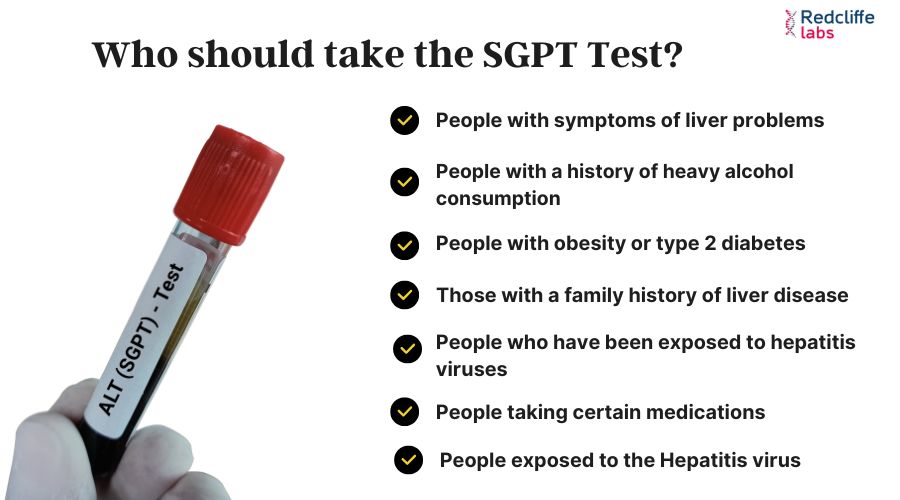
Anyone can take the SGPT test, but certain people might be recommended for this test:
- People with symptoms of liver problems
- People with a history of heavy alcohol consumption
- People with obesity or type 2 diabetes
- Those with a family history of liver disease
- People who have been exposed to hepatitis viruses
- People taking certain medications
- People exposed to the Hepatitis virus
- People with liver diseases like hepatitis or cirrhosis.
What are the common symptoms related to abnormal SGPT levels?
High SGPT can cause noticeable symptoms. Here are some common symptoms that can be associated with abnormal SGPT levels:
- Fatigue and weakness
- Nausea and Vomiting
- Loss of appetite
- Stomach pain
- Jaundice
- Dark urine
- Easy bruising or excessive bleeding
- Swelling in the legs
- Itchy skin
Discuss any concerns about your liver health, even if you don't experience any symptoms, with your doctor. Early detection and intervention can help to manage liver problems.
How do I control SGPT levels?
Many illnesses, like chronic hepatitis, celiac disease, and even diabetes, can occur due to the presence of high SGPT levels, so if your SGPT levels are high, you should be taking active measures to get them under control. Here are a few tips that you can follow to get the excessive SGPT levels under control:
- Eat your veggies—Vegetables are rich in antioxidants, which help reduce rising SGPT levels. You can include veggies like bell peppers, spinach, carrots, etc., in your regular diet.
- Avoid junk: Junk food is well known to be your health’s enemy. Keep away from those if you aim to reduce your SGPT levels because your liver is a key element in your body, and high SGPT levels directly affect your liver.
- Increase the Intake of Vitamin D—Vitamin D is known to avoid liver damage, and if you have high levels of SGPT, it is a boon for you. Include items like soy milk, mushrooms, oranges, and apples in your diet, as they contain vitamin D.
- Go for a Vegetarian Diet—Doctors recommend that you avoid meat-based food items if you have high SGPT levels. So avoid meat and try a healthy vegetarian diet.
Remember, these tips include dietary changes, so you must consult with your health provider before you start implementing them. They will advise you on what diet is appropriate for you, looking into your medical history.
Top 6 Reasons Regular SGPT Testing Is Important
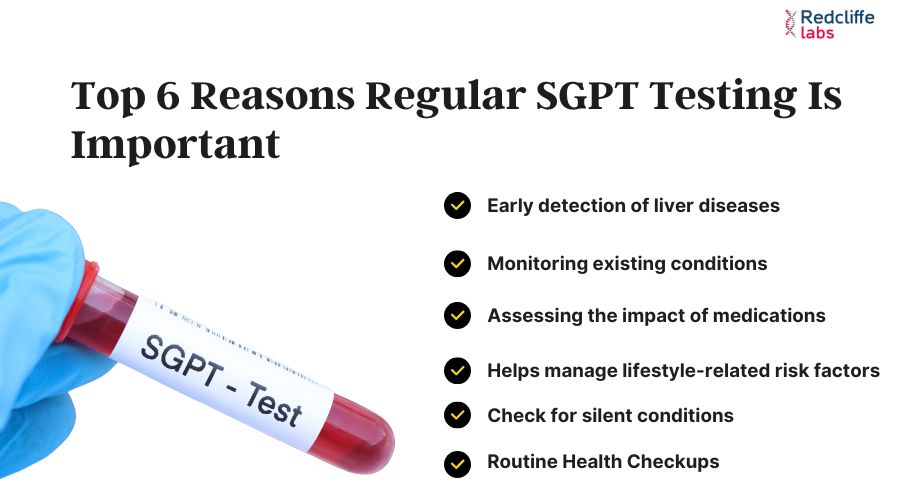
The SGPT is a diagnostic tool to monitor liver health. Getting the SGPT (serum glutamic pyruvic transaminase) test, or the ALT test, done regularly can help maintain liver health, enabling early detection, effective management, and preventing complications. Regular SGPT testing is important because:
- Early detection of liver diseases: Regular SGPT testing helps identify liver diseases such as hepatitis (A, B, C, etc.). It also detects non-alcoholic fatty liver disease (NAFLD), alcoholic liver disease, and liver cirrhosis. High SGPT levels often indicate liver damage, allowing early diagnosis and timely treatment.
- Monitoring existing conditions: Regular testing can benefit people suffering from liver diseases or chronic conditions like diabetes, obesity, or hypertension. It allows them to monitor disease progression and evaluate the efficacy of treatment or lifestyle changes.
- Assessing the impact of medications: Medications such as antibiotics, painkillers, or statins can pressure your liver. Regular SGPT testing confirms if these medications have caused harmful side effects.
- Helps manage lifestyle-related risk factors: Poor diet, smoking, or too much drinking can silently harm the liver. Hence, the SGPT test becomes relevant to detect damage early or encourage lifestyle modifications to reverse the harm.
- Check for silent conditions: Liver conditions do not show signs early and thus remain asymptomatic for years. Hence, regular testing is crucial if you have a family history of liver disease or metabolic disorders like diabetes or high cholesterol.
- Routine Health Checkups: Routine health checkups help identify early signs of disease. They increase the chances for effective treatment. Regular health screenings and the SGPT test ensure comprehensive health monitoring and identify any hidden abnormalities.
When to consult a doctor?
You should consult a doctor.
- If your SGPT levels are low and you experience fatigue, jaundice, abdominal pain, or unexpected weight, consult your doctor immediately.
- If you have a family history of liver disease or risk factors such as obesity, diabetes, or alcohol use.
SGPT and SGOT Test- Are they the same?
Many people confuse SGPT and SGOT blood tests, but there is a difference; here are some of those for your better understanding:
| Feature | SGPT | SGOT |
| Full Form | Serum Glutamate Pyruvate Transaminase | Serum Glutamate Oxaloacetate Transaminase |
| Location | Liver | Liver, heart, muscles |
| Specificity | Specific to liver health | Indicates liver issues and muscle injury |
| When is it done? | As a part of the liver function test | As part of liver function and cardiovascular tests |
Doctors usually recommend both tests to get a clearer picture of liver health.
What causes the high or low SGPT levels?
There are multiple reasons if your SGPT report is high. Here are some:
Non-Alcoholic Fatty Liver (NAFLD): Fat buildup in the liver not caused by alcohol, often linked to obesity and poor diet.
Alcoholic Liver Disease: Liver damage due to long-term heavy alcohol consumption.
Hepatitis: Liver inflammation caused by viral infections (A, B, C, etc.) or other factors.
Jaundice: Yellowing of the skin and eyes due to excess bilirubin from liver dysfunction.
Liver Cirrhosis: Advanced liver scarring that impairs normal liver function.
Autoimmune Hepatitis: The immune system mistakenly attacks healthy liver cells.
Muscle Injury: Damage to muscles that can release enzymes affecting liver test results.
Medications: Certain drugs can stress or damage the liver, raising SGPT levels.
Celiac Disease: An autoimmune reaction to gluten that may also impact liver enzymes.
Similarly, there are multiple reasons for one to have low SGPT levels:
- Vitamin B6 Deficiency
- Chronic Kidney Disease or Failure
Note: Low SGPT levels are mostly not considered dangerous.
SGPT Test price at Redcliffe Labs
The SGPT test price at Redcliffe Labs is INR 270. You can book your appointment using the Redcliffe Labs App or call us to book your test. With a wide network of doctors, phlebotomists, and 2000+ collection centers across PAN India, we are committed to serving every Indian and making a healthier Bharat. From routine tests to specialized genetic tests, we have 3600+ Lab tests to cover all your health diagnostic needs. Our labs are ISO-certified and NABL-accredited and follow standard procedures to create 100% accurate reports. We aim to make healthcare accessible to everyone across India. Besides, don't worry about the test prices; we offer affordable health checkups. Looking for an SGPT ALT test or other blood test? Choose Redcliffe Labs!
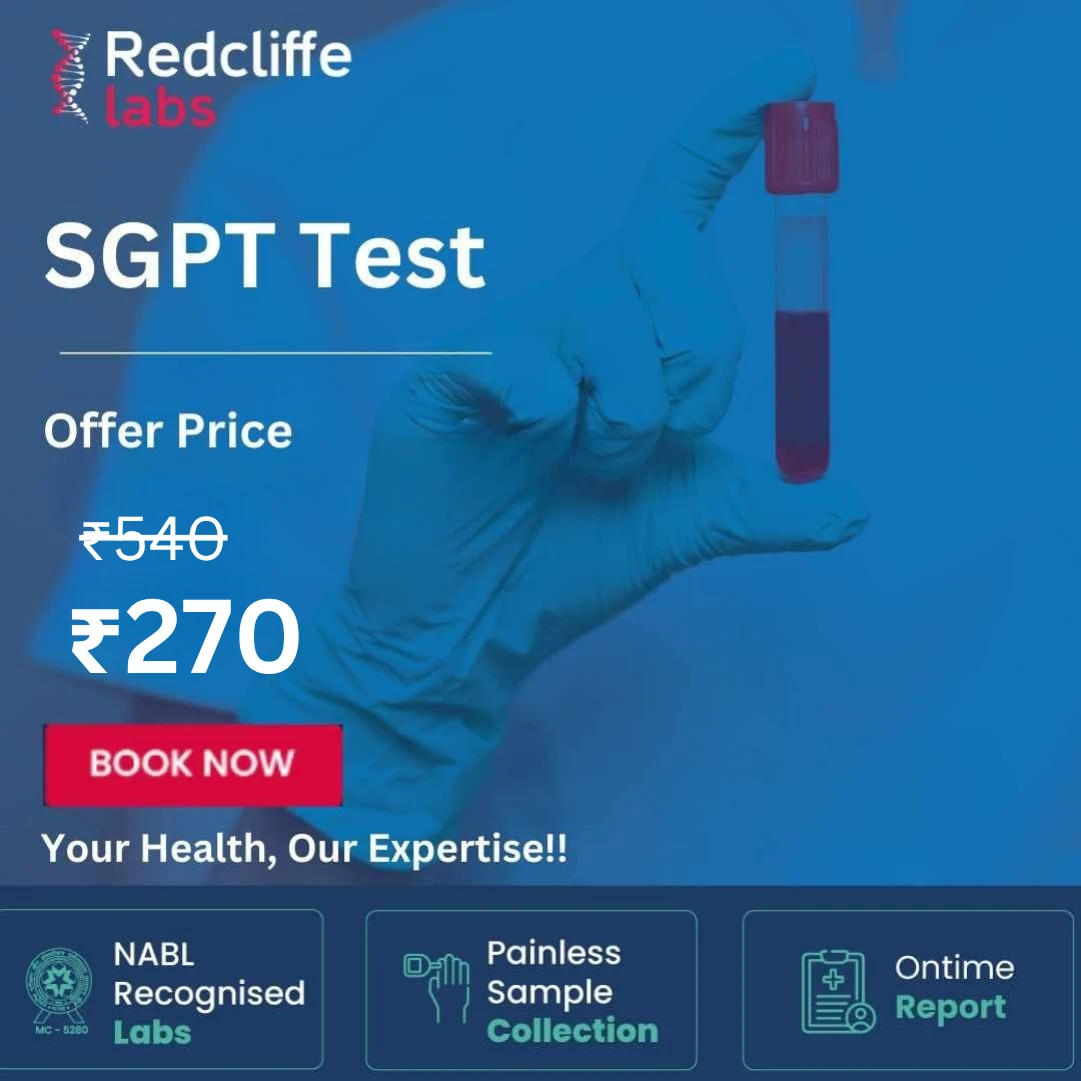
SGPT Test Cost in Different Cities - Redcliffe Labs
| City Name | Discounted Price |
| Delhi | ₹270 |
| Ahmedabad | ₹270 |
| Mumbai | ₹270 |
| Bangalore | ₹270 |
| Noida | ₹270 |
| Pune | ₹270 |
| Lucknow | ₹270 |
| Hyderabad | ₹270 |
| Chennai | ₹270 |
| Gurgaon | ₹270 |
| Jaipur | ₹270 |
| Faridabad | ₹270 |
| Indore | ₹270 |
| Patna | ₹270 |
Note: We also offer SGPT Test PAN India. Please call the number 8988988787 to check the availability of our services in your area.
Take the SGPT test to Understand Your Liver Health.
The SGPT, or serum glutamic pyruvic transaminase, test provides crucial information about liver health. This vital organ filters toxins, processes nutrients and produces essential proteins.
The SGPT ALT test measures SGPT levels, helping identify potential liver issues like hepatitis, fatty liver disease, or cirrhosis. Early detection allows for timely intervention and treatment, potentially preventing serious complications. Identifying liver problems will enable us to take action early and potentially reverse damage or prevent progression. The SGPT test can be used to track the effectiveness of treatment for existing liver conditions.
Consult your doctor and take the SGPT test if you are not sure about the symptoms. Your doctor may recommend the SGPT ALT test with additional tests to identify the cause of symptoms and underlying conditions to determine if it's right for you. Moreover, you can include the SGPT test as part of your routine checkups and empower yourself to take a proactive approach to your well-being.
5 Simple Steps to Manage Your Health with Redcliffe Labs
Quick, Simple & Convenient; trusted care delivered to your doorstep.

Start Your Online Booking
Open the Redcliffe Labs website/app. Select the test or package and enter your details. Schedule the service for your preferred slot.

Live Tracking
Stay updated with real-time tracking for a smooth and timely home sample collection.

Sample Collection
Our certified experts ensure a smooth, hygienic, and fully compliant sample collection experience.

Doctor-Verified Smart Reports
Every report is clinically checked by expert doctors and shared with smart, actionable insights.

Your Health Journey Continues Post Reports
Consult with our expert medical team to get actionable insights to improve your health.
Nearby Labs(9)
Redcliffe Labs Noida

MC-5280
Redcliffe Collection Center
Redcliffe Collection Center
Redcliffe Collection Center
Redcliffe Collection Center
Redcliffe Collection Center
Redcliffe Collection Center
Redcliffe Collection Center
Redcliffe Collection Center
Frequently Asked Questions
What is an SGPT test?
What is the price of the SGPT test?
What happens if SGPT is high?
What is a normal SGPT level?
How can I reduce my SGPT level?
Why was the SGPT test done?
How is the SGPT test done?
Is there any risk associated with the SGPT test?
Is fasting required for the SGPT blood test?
Can I book a SGPT / ALT Test near me?
Can I book a home collection for a SGPT / ALT Test?
Health Articles & Blogs
My Health
Stay informed with our expert health articles and blogs. Explore comprehensive guides on diseases, nutrition, preventive care, and wellness tips to help you make better health decisions.
Why is PCOS Continuously Rising in Women?

10 Healthy Holi Recipes for Your Fitness Goals in 2026
Looking for healthy Holi recipes? Discover 10 festive dishes that support your fitness goals while keeping celebrations delicious.

Importance of Heart Health Before Pregnancy: Everything You Need to Know

Migraine Treatment at Home: Effective Ways to Relieve Migraines Naturally
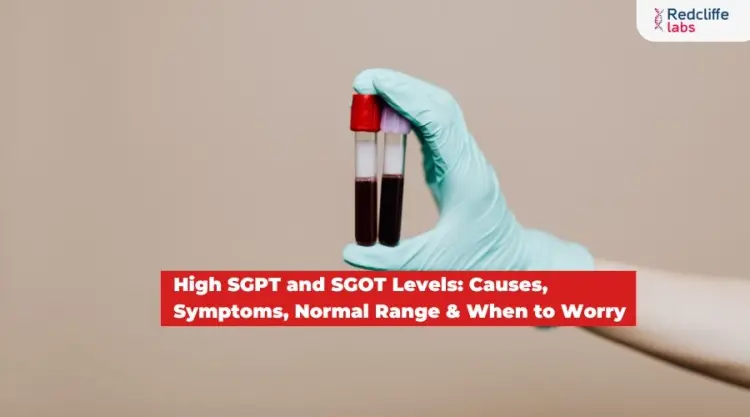
High SGPT and SGOT Levels: Causes, Symptoms, Normal Range & When to Worry

Brain Hemorrhage Symptoms: Early Warning Signs, Types, Causes & When to Seek Emergency Care

What is SGPT in Blood Reports? Everything You Need to Know

Capsicum (Shimla Mirch) 101: Benefits, Nutritional Value, Uses and More
Explore My Health
